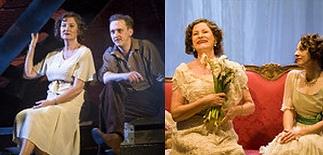The Glass Menagerie Review 2010
Set in St Louis in the 1930s and 40s, 'The Glass Menagerie' was Tennessee Williams's second play to be produced and the first to achieve real success. In fact, in a letter, Williams described the 1945 box office business as 'booming' which suggests it was something of a runaway success. Originally entitled 'The Gentleman Caller' and progressing through several versions, it opened initially in Chicago in 1944, before transferring to Broadway in 1945 where it won a Critics Circle award.
'The Glass Menagerie' is a memory play. In other words, it's a play which looks back at events in the life of the narrator, Tom Wingfield (excellently played here by Leo Bill). Specifically, Tom takes us back to a period of his life when he was living at home with his mother, Amanda, and his chronically shy sister, Laura. Tom makes it plain to us right at the start that the play is not illusion tying to be reality, rather it is truth masquerading as illusion. And that obviously set the cogs working in the mind of designer Jeremy Herbert who has created a set which employs illusion to conjure up the Wingfield apartment, and the overall effect lies as much in the mind of the audience as on the stage. But it works well - there's enough in the way of furniture and walkways to provide the framework - the rest is left to the actors and the audience.
Laura Wingfield, played by Sinéad Matthews, is not only painfully shy, but has the added disadvantage of having a physical impairment which makes her limp. Her mother won't tolerate her daughter being described as a cripple - even though she uses the term herself in anger and frustration later in the play. Laura has no job and her mother has enrolled her on a business course. But Laura has failed to attend classes, preferring to avoid contact with others and spend her time listening to old gramophone records and tending to her glass animals - her 'menagerie'. Ms Matthews' sensitive portrayal is both moving and sympathetic.
Amanda Wingfield (Deborah Findlay) is a woman whose dreams have been shattered. She harks back to her younger days as a Southern Belle when, she claims, she was the subject of attention of numerous 'gentlemen callers'. But the man she chose to marry deserted her and her children, and her current fixation is to get Laura married so she can have some kind of independent life. Amanda though doesn't seem to have the same concern about Tom's future. But she does berate him about his eating habits, his smoking and the amount of time he spends out of the house, supposedly 'at the movies'. Deborah Findlay doesn't side-step the domineering aspect of Amanda's personality, but she also shows Amanda's more sensitive side - such as when she's reminiscing about her courting days - and also makes her more good-humoured. Though we can still see why Tom would want to move away from her nagging reach, Ms Findlay's Amanda isn't simply the archetypal overbearing mother.
'The Glass Menagerie' contains considerable biographical detail from Tennessee Williams's own life. Williams lived with his mother and sister in a dingy apartment, and his sister collected glass animals which in his mind represented the tender things which 'relieved the austere pattern of life and made it endurable'. Perhaps it's because of the autobiographical nature of the play that Joe Hill-Gibbins directs with such an obvious desire to be faithful to the author's intentions, and to build on the idea of truth as illusion. Music accompanies the action almost throughout the play. Simon Allen plays a variety of instruments including glasses filled with water, and Eliza McCarthy provides some haunting melodies and chords on a baby grand perched on a walkway above the stage.
Overall, this is a thoroughly enthralling and absorbing revival, admirably directed and well-acted. Williams's observations about the interaction between family members will still strike a note with many, and so it maintains considerable relevance in spite of it's advancing years.
"The heart of Williams's play is exactly caught; and for that I can forgive the production's dutiful obeisance towards the gratuitous expressionist trappings. "
Michael Billington for The Guardian
"Sensitive, beautifully pitched revival "
Sarah Hemming for The Financial Times
"You leave the theatre in no doubt that you have witnessed a deeply felt, beautifully judged production of a masterpiece. "
Charles Spencer for The Daily Telegraph
External links to full reviews from popular press
The Guardian - Daily Telegraph
Originally published on
